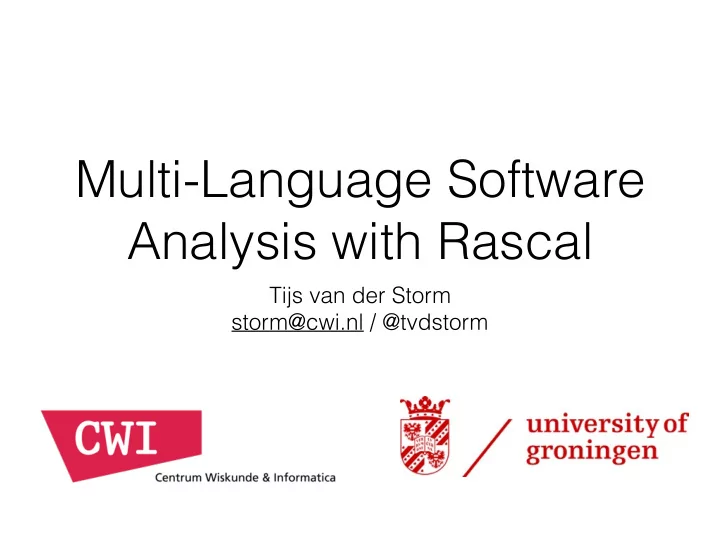

Multi-Language Software Analysis with Rascal Tijs van der Storm storm@cwi.nl / @tvdstorm
CWI SWAT Jurgen Vinju (group leader) reverse engineering, static analysis, renovation Me DSLs, language workbenches, language design
Rascal • Functional programming with curly braces • Runs on the JVM • Command line REPL + Eclipse-based IDE • Source: https://github.com/usethesource/rascal • Download: http://www.rascal-mpl.org
Metaprograms • code visualizers • smell detectors • refactoring tools • interpreters • static analyses • compilers • bug finders • metrics tools • style checkers • obfuscators • pretty printers • …
AWK Rascal ANTLR grep SQL http://www.rascal-mpl.org http://usethesource.io/ etc.
Integration • Data types for • concrete syntax trees, • abstract syntax trees, • source locations, • n -ary relations • Pattern matching against all data types • Comprehensions over all collection types
Finding public fields • Task: find public fields in Java source code • Use grep? Imprecise :-( • Use ANTLR? Too much work :-( • Use Rascal? Let’s see!
The type of Java Return a list of compilation unit source locations parse trees list[loc] publicFields(start[CompilationUnit] cu) = [ f@\loc | /(FieldDec)`public <Type _> <Id f>;` := cu ]; Concrete syntax Search for matching matching, nodes in the tree modulo layout
start[CompilationUnit] trafoFields(start[CompilationUnit] cu) { return innermost visit (cu) { case (ClassBody)`{ ' <ClassBodyDec* cs1> Match source pattern Repeat until no more ' public <Type t> <Id f>; (list matching) changes ' <ClassBodyDec* cs2> '}` => (ClassBody)`{ ' <ClassBodyDec* cs1> ' private <Type t> <Id f>; ' public <Type t> <Id getter>() { ' return <Id f>; ' } ' public void <Id setter>(<Type t> x) { ' this.<Id f> = x; ' } ' <ClassBodyDec* cs2> construct new '}` class body when Id getter := [Id]"get<f>", Id setter := [Id]"set<f>" Make getter/setter } identifiers }
M3: an extensible model for capturing source code facts Generic M3: containment, files, Extract name referencing Software Extension project Java M3: classes, PHP M3: … inheritance, functions, classes, methods, calls, … calls, …
Query and synthesize Generic M3: containment, files, name referencing Analysis results and/or transformations Java M3: classes, PHP M3: inheritance, functions, classes, methods, calls, … calls, …
Core M3 “database schema” data M3( rel [ loc name, loc src] declarations = {}, rel [ loc name, TypeSymbol typ] types = {}, rel [ loc src, loc name] uses = {}, rel [ loc from, loc to] containment = {}, list [Message] messages = �[^ , rel [ str simpleName, loc qualifiedName] names = {}, rel [ loc definition, loc comments] documentation = {}, rel [ loc definition, Modifier modifier] modifiers = {} ) = m3( loc id);
The source location Path scheme Authority |project: �/0 rascal - ecore/src/lang/ecore/ Refs.rsc|(1821,130,<54,0>,<56,1>)) begin and File offset Length end column and line
Logical locations • |java+field://java/lang/System/out| • |java+method://java/lang/System/out.println(Object)| • … logical physical rel [ loc name, loc src] declarations = {}, physical logical rel [ loc src, loc name] uses = {}
Simple example: JStm • State machine DSL with integrated Java • Compiles to plain Java class • Create custom M3 for DSL • Merge with “stock” M3 for Java • => cross language analysis ;)
package doors; import java.util.List; import java.util.ArrayList; statemachine Doors { private List<String> tokens = new ArrayList<String>(); event open "OP2K"; event close "CL2K"; state closed { System.out.println("We're closed now"); tokens.add( token ); on open �=? opened; } state opened { System.out.println("We're opened now"); on close �=? closed; } }
package doors; Java Code import java.util.List; import java.util.ArrayList; Java Code statemachine Doors { private List<String> tokens = new ArrayList<String>(); event open "OP2K"; event close "CL2K"; Java Code state closed { System.out.println("We're closed now"); tokens.add( token ); on open �=? opened; } Java Code state opened { System.out.println("We're opened now"); on close �=? closed; } }
package doors; import java.util.List; import java.util.ArrayList; statemachine Doors { private List<String> tokens = new ArrayList<String>(); event open "OP2K"; DSL code event close "CL2K"; state closed { System.out.println("We're closed now"); tokens.add( token ); on open �=? opened; DSL code } state opened { System.out.println("We're opened now"); on close �=? closed; } DSL code }
Analysis questions • Back linking: which state does this Java code belong to? • Reachability: which Java methods are reachable from processing event token “x”? • Type checking embedded Java code • Name resolution across language boundaries • Rename state machine => rename in Java client code • …
dsl — A domain specific language, where code is written in one language and errors are given in another. https://programmingisterrible.com/post/65781074112/devils-dictionary-of-programming
Summary • Meta programming with Rascal : from ad hoc to systematic • M3 : a generic source code model • Entities identified by (logical) source locations • Cross language linking of entities • Example: JStm language => DSL + Java
Recommend
More recommend